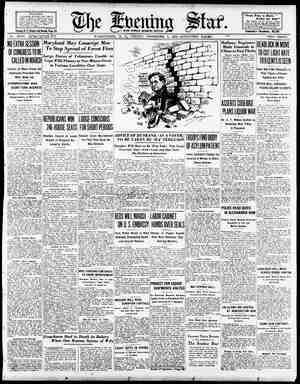The Seattle Star Newspaper, November 7, 1924, Page 13
You have reached the hourly page view limit. Unlock higher limit to our entire archive!
Subscribers enjoy higher page view limit, downloads, and exclusive features.
: [SECTION TWO | A)aris NOW 2 Plague in The Seattle: Star WILL PROBATED JURY FREES TWO ®oidemyef civ. Three Simpson Daughters to Were Sentenced to 60 Days “” Civil Official of Matson dine Visits Seattle 4 stil Sick Wit Los Aggeles Divide $100,000 Estate for Cruelty to Dog Not Live Outside City ae be, 6 oom ¢ « — ! Economic Merchandisi Sells Fahey -Brockm< Standard Prices © Things don’t just happen in merchandising. There’s always a | reason or a flock of reasons. And that holds good whether you buy a motor } car, a suit of clothes or an overcoat. The price you pay for any article is '} largely determined by things apart from intrinsic value. For instance, a cer- tain motor car sells from $1400 up to $2000, depending on the type. _ Practiced, unprejudiced engineers tell us that you can pay $1000 more fora car but the extra thousand will not buyitssuperior in sound transportationvalue. ee ll Se REM IRNT ERE Re That’s exactly what we claim for Fahey-Brockman Clothes. You can pay $10 more for a suit or an over- coat than F-B Prices, but the extra $10 will not buy superior clothing value. Of course, shrewd buyers save that extra ten. That’s why we have 60,000 customers. The day of mass production has arrived in the men’s clothing business just as it has arrived in the hat and shoe business as well as the motor car business. Mass production has given us better shoes, hats, clothes and motor cars for less money. Now Fahey-Brockman claim this: Wherever mass production is linked up directly with mass selling, tremendous economies are effected — the final customer pays less for the goods. Here’s chapter and verse showing exactly how we save each and every customer $10 at least on every garment we sell. 1. We Buy at the Factory— —that cuts maker's selling expense. 7. We Do a Cash Business— —that means no credit losses. 8. We Enjoy Quick Turnover— —that spells small profit per sale. ' 9. We Maintain a Low- 2. We Buy in Large Quantities— —that earns quantity discounts. 3. We're Always in the Market— CAN'T DO THAT Service Employes Can —that insures up-to-date styles. 4. We Ship Direct to Our Stores— 49 —that wipes out middlemen eatpense. 5. We’re Upstairs to 11. Reduce Rent— —that saves us $50,000 a year. 6. We’ve Plain Fixtures— 12. —that cuts down “fixed overhead.” Fahey-Brockman Bldg. Third and Pike Seattle —_—— Price Policy— —that means steady trade the year round. . We Do a Big Repeat Business— —that means inexpensive selling. We Have Thousands of Boosters— —that’s effective advertising. We Guarantee Every Garment— —that means satisfied customers. > | PAGES 13 PO 24 VASCISTI APOLOGIZE Du Barry 35 Suits and Overcoats Guaranteed Values # The Last Word in Style The F-B Stores are stocked w suits and overcoats than ever before: ith a larger variety of new —more fine woolens —more rich patterns —more new models —more smart styles all direet from New York, Sold at the same standard prices— carrying the same saving of $10 at least—backed by the samo guarantee and followed with the same personal service. Raleigh Bldg. Sixth and Washington Portland RECEIVER ASKED ° Piano Co. Made Defendant in Action §





